Fri 10 May 2013
A Two-for-One Movie Review by Dan Stumpf: BELLA DONNA (1934) and TEMPTATION (1946).
Posted by Steve under Crime Films , Reviews[5] Comments
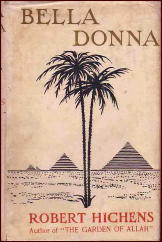
BELLA DONNA. Twickenham Studios, UK, 1934. Mary Ellis, John Stuart, Nigel Armine, Cedric Hardwicke, Conrad Veidt, Jeanne Stuart. Based on a novel by Robert Hichens. Director: Robert Milton.
TEMPTATION. Universal Pictures, 1946. Merle Oberon, George Brent, Charles Korvin, Paul Lukas, Lenore Ulric, Arnold Moss. Based on a novel by Robert Hichens. Director: Irving Pichel.
Bella Donna is one of those unique little films that will stay on my mind long after better-known flicks have gone their way. Based on a novel by Robert Hitchens and a play by James B. Fagan, it weaves, rather than tells, the story of a divorcee apparently used to using men and using them up, who marries a chump and goes with him to Egypt where he’s apparently some sort of busy muckety-muck with a job that entails long separations.
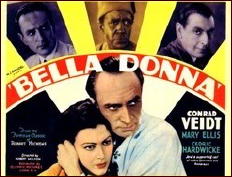
Bored and horny, she falls under the spell of a sinister Egyptian — himself something of a rat with women — and finds herself hopelessly addicted to his charms. So much so that when he expresses annoyance at her husband’s infrequent presence, she decides on divorce-by-poison, with intriguing consequences.
This story is put across in a series of rather stagey confrontations — the plot is developed and moved around by long scenes of dialogue rather than action — but this in no way diminishes the charms of a film whose chief allure is in mood and atmosphere. Bella Donna starts out as a very properly British sort of thing, with smoking jackets, drawing rooms, and a nearly palpable sense of Stuffie Olde Englande, furthered by the playing of Mary Ellis as the divorcee, John Stuart as the chump, and especially Sir Cedric Hardwicke as the chump’s wise doctor-friend, looking ruefully on as his old chum hastens to ruin.
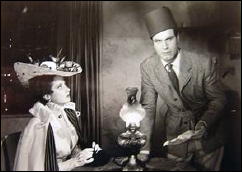
Once the couple leaves England, though, we get an equally visceral sense of Egypt as some eerie fairyland, a kingdom suffused with dread and desire in equal measure. Conrad Veidt turns in a magnetic performance as the sinister Egyptian (despite the fact that his makeup keeps changing from pale Eurasian to something resembling a minstrel show) stalking through sets of literally byzantine splendor, and director Robert Milton maintains a slow but insistent pace, like the music of a snake-charmer, as the story plays itself out to a conclusion I will probably never forget. The last shot of Bella Donna is one of those rare cinematic codas, like the last shot of Vertigo, The Searchers or Shock Corridor, that says much more than words ever will, and one that’s a lot of fun to get to.
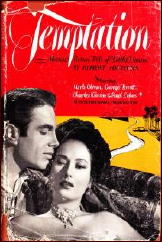
The story was remade in Hollywood in 1946 as Temptation, directed by Irving Pichel, with Merle Oberon as the femme-would-be-fatale, who marries George Brent over the objections of Paul Lukas and subsequently falls for Charles Korvin. Temptation seems to have set the pattern for subsequent Victorian noir films like Ivy (1947) and So Evil My Love (1948) but it also shows the sad censorial effects of its time:
Where the Mary Ellis in the earlier film seemed warped by lust, Merle Oberon is merely enslaved by passion. Poisoning the chump becomes her lover’s idea, not her own, and both lover and erring wife must come to some explicitly sticky end. And I mean sticky. The writers apparently got themselves into a corner on this one, deciding that a big star like Merle Oberon had to meet her own fate (rather than get picked up by the cops) but Suicide as a plot resolution was not permitted in films then.
The result is a rather muddled off-screen affair recounted by Lukas to an unbelieving cop (nicely played by Arnold Moss, usually a heavy in the movies, and a very good one). There is, however, a rather nice wrap-up, and the rest of the film is done with enough grace and Hollywood polish to make it a pleasant 98-minute trip.
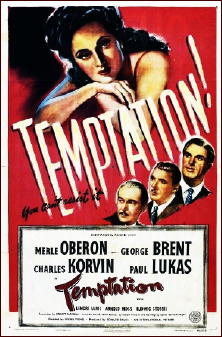
May 10th, 2013 at 1:37 pm
Dan,
Mary Ellis was really hot, and the “hottest” thing about her might be her longevity. She only died a few years ago at way over one hundred. I did not care for the remake. Not a Charles Korvin fan. Consider him charmless although effective in Ship Of Fools. Nigel Armine is a character, the chump, not a cast member.
May 10th, 2013 at 1:51 pm
These films sound interesting. I just ordered a copy of both films from a bootleg firm called Loving the Classics. Quality is supposed to be “B”. Sometimes this means it is not a good quality print but I’ll take a chance. I’ve always liked Conrad Veidt.
May 10th, 2013 at 3:46 pm
Walker –
Just a few months ago I had my first purchase from Loving the Classics, based in Wisconsin. They’re close to where I live so I got the DVD rather fast. I ordered a very rare movie — DEATH IN HIGH HEELS, based on Christianna Brand’s first novel — also graded a B. The quality of that DVD is pretty good, but not top notch. I’m not very demanding, but it’s much better than some other homemade DVDs I’ve ordered which have been taken from horribly scratched prints, jump frames due to bad sprocketing, crackly sound, etc.
May 10th, 2013 at 4:39 pm
Conrad Veidt was quite an interesting character, off-screen, too.
I just read his Wiki- biography .
The Doc
May 10th, 2013 at 7:39 pm
Barry–
You’re right, Korvin lacks the screen presence necessary for the part, but he wasn’t bad (or rather he was bad, rather neatly) as The Eagle on a season of ZORRO.